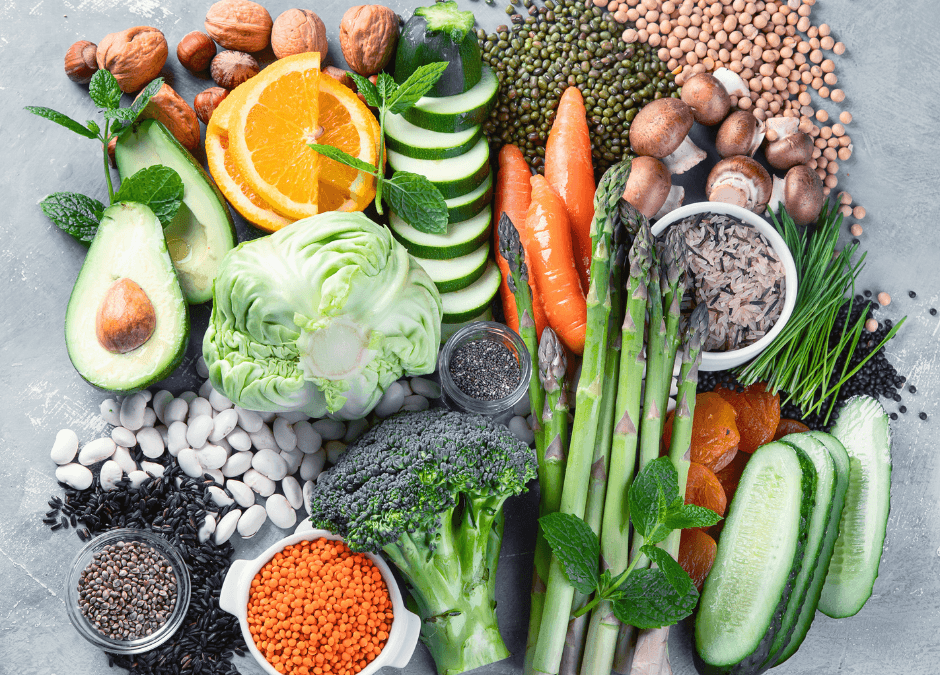Breast cancer nutrition myths and misinformation abound! One of the most misunderstood topics?
Plant-based diets.
Recently one of my clients shared that after finishing treatment she met with a personal trainer specializing in cancer recovery who suggested she eat a plant-based diet. The problem with that was, the trainer didn’t provide details.
My client immediately thought. . .“What does a plant-based diet mean? Do I have to eat only green things?”
In my experience, when a breast cancer survivor is advised to eat a plant-based diet they automatically think “vegan”, yet that’s not what plant-based translates to. Let’s clear that misconception up with a little plant-based diet education.
Breast Cancer and Plant Based Diet Safety
Even though plant-based diets are more common than even 10 or 15 years ago, I’ll start by clearing up any misconceptions about the healthfulness and appropriateness of a plant-based diet.
The Academy of Nutrition and Dietetics position paper on vegetarian diets states: “. . .vegetarian diets, including total vegetarian and vegan diets are healthful, nutritionally adequate, and may provide health benefits in the prevention and treatment of certain diseases. Well-planned vegetarian diets are appropriate for individuals during all stages of the life cycle.”
What that means for you is if eating a vegan diet is a nutritional approach you want to try, by all means do so; done correctly, a vegan diet won’t compromise your health. The trick is to make sure your approach is “nutritionally adequate”, which requires deliberate planning and implementation to ensure a varied and balanced diet.
The foundation of a varied and balanced breast cancer vegan diet includes vegetables, fruits, legumes, grains, nuts and seeds. Other essentials are omega-3 fatty acids, vitamin B12, vitamin D and iodine.
Heard of “junk food” vegan diets? Yes, that’s a thing, but if you’re aiming for health and vitality, limit the junk and go for nourishing whole food options most often.
Protein in Breast Plant Based Diets
Wondering about getting enough protein? Be sure to include beans, peas, lentils, whole soy foods, nuts and seeds. This is where it’s important to be intentional, so plan these foods into your day. It’s certainly not impossible to do; start by thinking not only about meals, but snacks that include foods like hummus, veggies (yes, they have protein!), edamame or whole grain crackers with nut butter.
For more details about plant-based protein, click here to read my blog Plant-Based Protein Primer.
Not All Plant-Based Diets Are Equal
A vegan diet not for you? I get it – it’s not for everyone, and it’s not mandatory in order to reap the breast health benefits of putting more plants on your plate!
Here are SEVEN types of plant-based eating:
- Plant-based: includes vegetables, fruits, whole grains, legumes, herbs, spices, nuts and seeds.
- Semi-vegetarian or flexitarian: includes eggs, dairy, and occasionally meat, poultry, fish and seafood
- Pescatarian: includes eggs, dairy, fish and seafood, excludes meat and poultry
- Vegetarian: excludes meat, poultry, fish and seafood
- Ovo-vegetarian: excludes all animal-based foods, except for eggs
- Lacto-ovo vegetarian: includes eggs and dairy, excludes meat, poultry, fish and seafood
- Vegan: includes no animal or animal-derived foods (i.e. gelatin, whey, honey)
The American Institute for Cancer Research recommends a plant-based diet with a variety of fruits, vegetables, beans and whole grains as a pattern of eating that may help reduce risk of recurrence, and in the end, isn’t that what it’s all about?
Remember, plant-based doesn’t mean vegan and as you’ve learned in this post, there’s a plant-based option for everyone.
____________________________________________________________
Thanks for reading my blog post! Inspired and/or enlightened by what you read? Be sure to subscribe so you never miss a new post.
Subscribe by CLICKING HERE to get your FREE copy of The Five Foods Survivors Should Eat
CLICK THIS LINK and watch my 2-minute Peaceful Plate program video!
Follow me on Instagram @hormone.breastcancer.dietitian
This information is for educational purposes only and is not intended as medical advice. Please consult your dietitian or doctor for guidance specific to your needs.
_______________________________________________

